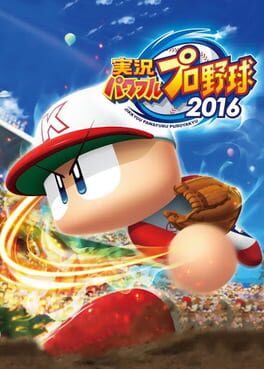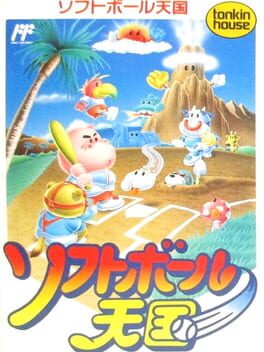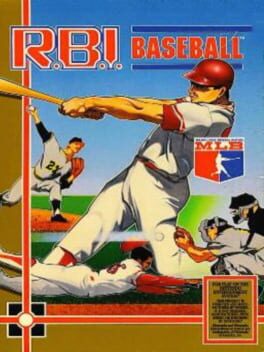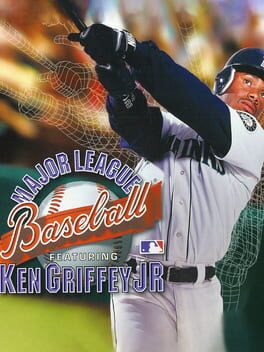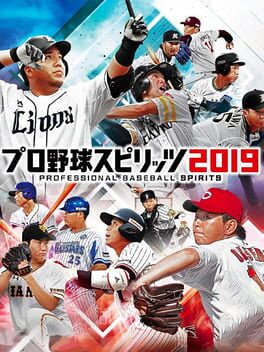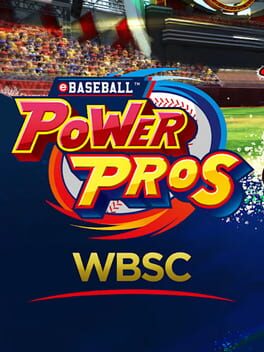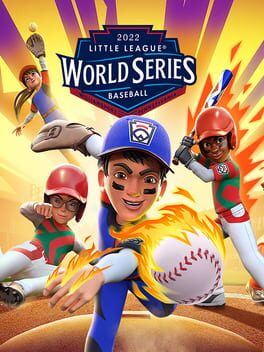3030club
Badges

1 Years of Service
Being part of the Backloggd community for 1 year
Favorite Games
013
Total Games Played
000
Played in 2024
000
Games Backloggd
Recently Reviewed See More
The $1 price tag doesn't get you licensed players or many modes of play, but everyone should give this a try for Konami's best-in-class baseball gameplay.
This is an online competition-focused spin-off from the Powerful Pro Yakyuu series that has released consistently in Japan since the Super Famicom days, with the last English-language console title being MLB Power Pros 2008.
The typical license Japanese league players are absent, replaced by a roster of fictional characters from the series' story modes over the years. Users create their own custom teams by choosing from this roster and customizing their uniforms.
The primary online mode is Championship, where world-wide users compete in three-inning baseball games with their custom team to earn new players and profile items. Private matches are also possible, between 3 and 9 innings (no cross-play between PS4 and Switch, sorry).
The English localization is barebones: The audio commentary and player/umpire voice samples are Japanese-only, and the chunky monospace font results in some words that need to be overly abbreviated to fit into the UI.
The off-line modes are very basic: There is a practice mode, off-line versus games either with local co-op/competitive games for 1 to 4 players or against an AI, and a tournament/league mode for adding a little structure to a series of games.
The gameplay is the star of the show. Power Pros is both accessible and deep, with a sky-high skill ceiling you might not expect from the cartoon art style.
Super Mega Baseball is the most similar States-side baseball game, with a similar cursor aiming batting and pitching style, but Power Pros has honed the game feel for decades.
Fielding requires practice and skill but feels slicker and more responsive than any other baseball game in history.
And unlike MLB The Show, there is a very clear connection between player skill and results. You won't find yourself blaming RNG too often (there are semi-random fielding errors, especially when a player is out of position).
At least on launch week, this certainly isn't a polished or feature-rich title, but the price is right at $1 and the gameplay can't be beat if you want to play online or have a local friend for multiplayer. If you only want to play single-player and can't read Japanese, hopefully this is just a prelude to a fully featured and fully localized Power Pros release in the near future.
This is an online competition-focused spin-off from the Powerful Pro Yakyuu series that has released consistently in Japan since the Super Famicom days, with the last English-language console title being MLB Power Pros 2008.
The typical license Japanese league players are absent, replaced by a roster of fictional characters from the series' story modes over the years. Users create their own custom teams by choosing from this roster and customizing their uniforms.
The primary online mode is Championship, where world-wide users compete in three-inning baseball games with their custom team to earn new players and profile items. Private matches are also possible, between 3 and 9 innings (no cross-play between PS4 and Switch, sorry).
The English localization is barebones: The audio commentary and player/umpire voice samples are Japanese-only, and the chunky monospace font results in some words that need to be overly abbreviated to fit into the UI.
The off-line modes are very basic: There is a practice mode, off-line versus games either with local co-op/competitive games for 1 to 4 players or against an AI, and a tournament/league mode for adding a little structure to a series of games.
The gameplay is the star of the show. Power Pros is both accessible and deep, with a sky-high skill ceiling you might not expect from the cartoon art style.
Super Mega Baseball is the most similar States-side baseball game, with a similar cursor aiming batting and pitching style, but Power Pros has honed the game feel for decades.
Fielding requires practice and skill but feels slicker and more responsive than any other baseball game in history.
And unlike MLB The Show, there is a very clear connection between player skill and results. You won't find yourself blaming RNG too often (there are semi-random fielding errors, especially when a player is out of position).
At least on launch week, this certainly isn't a polished or feature-rich title, but the price is right at $1 and the gameplay can't be beat if you want to play online or have a local friend for multiplayer. If you only want to play single-player and can't read Japanese, hopefully this is just a prelude to a fully featured and fully localized Power Pros release in the near future.
There's plenty of room in the market right now for an arcade-style baseball game (Super Mega Baseball, despite the name and cartoon art style, plays like a (very fun and fast-paced) simulation-style baseball game). Unfortunately I can't recommend anyone give this game a try.
There are some shockingly basic problems with gameplay:
- Every time you take control of a fielder, they stop in place and have to slowly start accelerating again. So a groundball up the middle can easily roll to the wall as your center fielder starts, then stops, then again starts chasing the ball like they're stuck in the middle of the road in a bad dream.
- All pitching gameplay vs. the CPU is meaningless. I can't say with 100% certainty that pitch type and location are totally pointless, but I tested. I threw dozens of pitches as far out of the zone as I could, and I threw dozens more straight down the middle, and the results were indistinguishable. Almost all at-bats end with the ball put in play.
- Team power-ups are poorly explained, the logic behind when they can and can't be used isn't clear, and they're not at all balanced from team to team.
- Players will often ignore your inputs when you're trying to throw to a base, standing there while runners reach safely.
- I couldn't find the pitching attributes of my players anywhere in the pause menu. So when one pitcher got tired, I had to repeatedly sub him out for other guys on the team (pitching attributes appear when the player is on the mound) until I found one who could pitch. Maybe I was just being silly and this was in an obvious place, but the UI has several other similar issues.
There are plenty of other smaller problems (players and teams lack personality and seem randomly-generated; the scoreboard UI is awful; the sticker attribute system makes no sense; the actual team structure of the real Little League World Series was oddly replaced by a set of fictional teams) but that all sits behind the major gameplay issues.
The overall art style is the one piece I really enjoyed. The art in the menus is well-made, and the team logos are fun. The player models are decent. The fields (all fictional except for the home of the real LLWS, Howard J. Lamade Stadium) are well-designed and match their regions without being too fantastical.
It's a shame. I liked the 2008-2010 LLWS games (developed by Now Production, a totally separate studio) and I love a casual, mindless baseball game.
I played both the Switch version and the PlayStation Plus two-hour trial on PlayStation 5.
There are some shockingly basic problems with gameplay:
- Every time you take control of a fielder, they stop in place and have to slowly start accelerating again. So a groundball up the middle can easily roll to the wall as your center fielder starts, then stops, then again starts chasing the ball like they're stuck in the middle of the road in a bad dream.
- All pitching gameplay vs. the CPU is meaningless. I can't say with 100% certainty that pitch type and location are totally pointless, but I tested. I threw dozens of pitches as far out of the zone as I could, and I threw dozens more straight down the middle, and the results were indistinguishable. Almost all at-bats end with the ball put in play.
- Team power-ups are poorly explained, the logic behind when they can and can't be used isn't clear, and they're not at all balanced from team to team.
- Players will often ignore your inputs when you're trying to throw to a base, standing there while runners reach safely.
- I couldn't find the pitching attributes of my players anywhere in the pause menu. So when one pitcher got tired, I had to repeatedly sub him out for other guys on the team (pitching attributes appear when the player is on the mound) until I found one who could pitch. Maybe I was just being silly and this was in an obvious place, but the UI has several other similar issues.
There are plenty of other smaller problems (players and teams lack personality and seem randomly-generated; the scoreboard UI is awful; the sticker attribute system makes no sense; the actual team structure of the real Little League World Series was oddly replaced by a set of fictional teams) but that all sits behind the major gameplay issues.
The overall art style is the one piece I really enjoyed. The art in the menus is well-made, and the team logos are fun. The player models are decent. The fields (all fictional except for the home of the real LLWS, Howard J. Lamade Stadium) are well-designed and match their regions without being too fantastical.
It's a shame. I liked the 2008-2010 LLWS games (developed by Now Production, a totally separate studio) and I love a casual, mindless baseball game.
I played both the Switch version and the PlayStation Plus two-hour trial on PlayStation 5.
